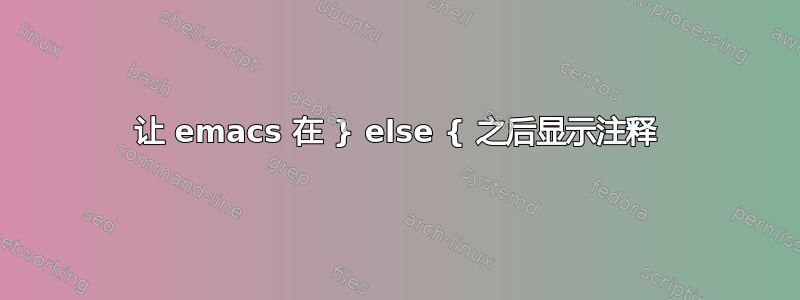
最好通过一个例子来描述这一点。假设您有以下 C 源文件:
if (something is true)
{
meh();
} else if (something else is true) {
foo();
} else { // something even different must be true
bar();
}
现在在 emacs 中,当你输入最后一个时},它会说Matches } else {。
我怎样才能让它说出整行,即Matches } else { // something even different must be true?
提前致谢。
答案1
将此更改为'blink-matching-open可实现您的要求。我已将其重命名为,'my-blink-matching-open以便您不会丢失原始内容。定义之后是使此例程生效的设置。
(defun my-blink-matching-open ()
"Move cursor momentarily to the beginning of the sexp before point."
(interactive)
(when (and (> (point) (point-min))
blink-matching-paren
;; Verify an even number of quoting characters precede the close.
(= 1 (logand 1 (- (point)
(save-excursion
(forward-char -1)
(skip-syntax-backward "/\\")
(point))))))
(let* ((oldpos (point))
(message-log-max nil) ; Don't log messages about paren matching.
(atdollar (eq (syntax-class (syntax-after (1- oldpos))) 8))
(isdollar)
(blinkpos
(save-excursion
(save-restriction
(if blink-matching-paren-distance
(narrow-to-region
(max (minibuffer-prompt-end) ;(point-min) unless minibuf.
(- (point) blink-matching-paren-distance))
oldpos))
(let ((parse-sexp-ignore-comments
(and parse-sexp-ignore-comments
(not blink-matching-paren-dont-ignore-comments))))
(condition-case ()
(scan-sexps oldpos -1)
(error nil))))))
(matching-paren
(and blinkpos
;; Not syntax '$'.
(not (setq isdollar
(eq (syntax-class (syntax-after blinkpos)) 8)))
(let ((syntax (syntax-after blinkpos)))
(and (consp syntax)
(eq (syntax-class syntax) 4)
(cdr syntax))))))
(cond
;; isdollar is for:
;; http://lists.gnu.org/archive/html/emacs-devel/2007-10/msg00871.html
((not (or (and isdollar blinkpos)
(and atdollar (not blinkpos)) ; see below
(eq matching-paren (char-before oldpos))
;; The cdr might hold a new paren-class info rather than
;; a matching-char info, in which case the two CDRs
;; should match.
(eq matching-paren (cdr (syntax-after (1- oldpos))))))
(if (minibufferp)
(minibuffer-message " [Mismatched parentheses]")
(message "Mismatched parentheses")))
((not blinkpos)
(or blink-matching-paren-distance
;; Don't complain when `$' with no blinkpos, because it
;; could just be the first one typed in the buffer.
atdollar
(if (minibufferp)
(minibuffer-message " [Unmatched parenthesis]")
(message "Unmatched parenthesis"))))
((pos-visible-in-window-p blinkpos)
;; Matching open within window, temporarily move to blinkpos but only
;; if `blink-matching-paren-on-screen' is non-nil.
(and blink-matching-paren-on-screen
(not show-paren-mode)
(save-excursion
(goto-char blinkpos)
(sit-for blink-matching-delay))))
(t
(save-excursion
(goto-char blinkpos)
(let ((open-paren-line-string
(cond
;; When there's something following the brace
;; show the entire line
((save-excursion
(forward-char 1)
(skip-chars-forward " \t")
(not (eolp)))
(buffer-substring (line-beginning-position)
(line-end-position)))
;; Otherwise show the previous nonblank line,
;; if there is one.
((save-excursion (skip-chars-backward "\n \t") (not (bobp)))
(concat
(buffer-substring (progn
(skip-chars-backward "\n \t")
(line-beginning-position))
(progn (end-of-line)
(skip-chars-backward " \t")
(point)))
;; Replace the newline and other whitespace with `...'.
"..."
(buffer-substring blinkpos (1+ blinkpos))))
;; There is nothing to show except the char itself.
(t (buffer-substring blinkpos (1+ blinkpos))))))
(message "Matches %s"
(substring-no-properties open-paren-line-string)))))))))
(setq blink-paren-function 'my-blink-matching-open)
答案2
我对 emacs 没有太多经验,所以我不知道这是否可行,但我认为绝对值得一试:尝试将注释放在 else 和花括号之间:
} else /* something even different must be true */ {


